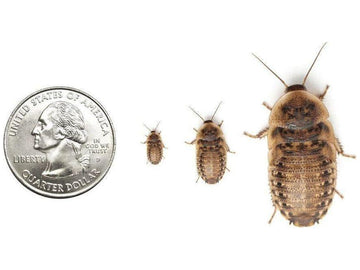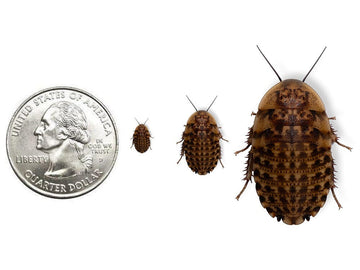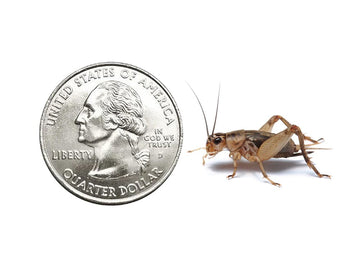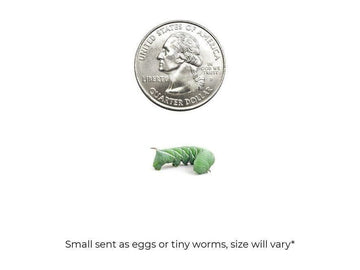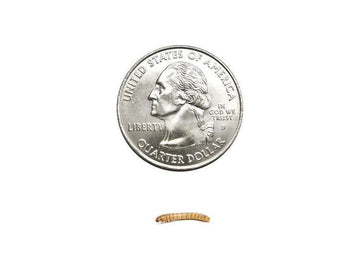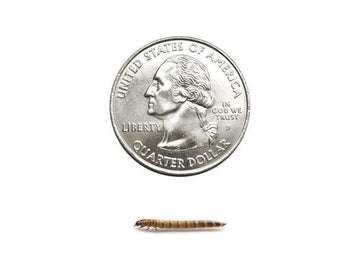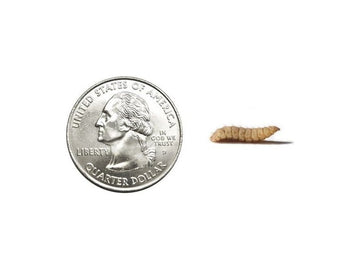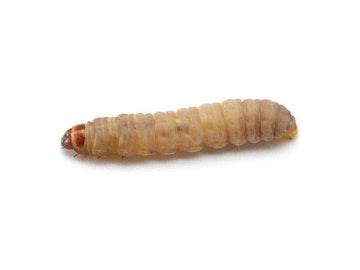Golden geckos (Gekko badenii) are 6-8” long, nocturnal, arboreal lizards from Vietnam. They primarily live in tropical rainforests, but are also known to live in rural human dwellings. Golden geckos have a robust body, tapered snout, and soft skin. True to their common name, their coloring is typically light gold on top and pale on the underside.
Golden geckos are not common in the pet trade, and their low handleability and sensitivity to poor husbandry make them intermediate-level pet reptiles. However, with good care, they can live at least 8 years.
Minimum terrarium size for golden geckos
The absolute minimum terrarium size for a single golden gecko is 18”L x 18”W x 24”H. Of course, larger is always better! Your gecko will happily put the extra space to use.
Housing multiple golden geckos in the same terrarium is not recommended, and is likely to result in fighting and injuries if attempted.
Do golden geckos need UVB?
Technically golden geckos can survive without it as long as they get enough vitamin D3 from their diet, but UVB is still highly recommended to help them thrive in captivity. UVB lighting helps provide a clear day/night cycle, provides a perfect supply of vitamin D3, strengthens the immune system, facilitates better digestion, and other benefits.
The best UVB bulbs for golden geckos housed in an 18” x 18” x 24” terrarium are:
- Zoo Med T8 Reptisun 10.0, 18”
- Arcadia ShadeDweller Kit
For best results, house the UVB bulb in a reflective fixture. Position the lamp on the same side of the terrarium as the heat lamp, 8-10” above the basking branch. UVB is blocked by glass and plastic, so placing the terrarium in front of a window doesn’t count as “free UVB” — in fact it can make your terrarium too hot due to the greenhouse effect.
Lights should be on for 11 hours/day during winter and 13 hours/day during summer to replicate seasonal cycling. And don’t forget to replace your UVB bulb every 6-12 months according to the manufacturer’s recommendation!
Best temperature for golden geckos
Golden geckos should have a basking temperature of 90°F, as measured by a digital probe thermometer with the probe attached to the basking branch. In order to allow for proper thermoregulation, the rest of the enclosure should range between 75-85°F. Nighttime temps should be between 70-75°F.
Provide daytime heat for your golden gecko with a halogen heat bulb. Halogen bulbs are the best way to imitate the warmth of sunlight indoors, and considered to be a superior form of reptile heating by experts. Hang the heat lamp from a lamp stand to prevent your gecko from getting burned if it climbs on the mesh.
Best humidity levels for golden geckos
Golden geckos are tropical lizards, so the humidity inside their enclosure should be fairly high: 60-80% on average. Humidity should be measured via digital probe hygrometer, with the probe placed in the middle of the terrarium.
Increase humidity by misting your gecko’s enclosure 1-2x/day with a spray bottle. Mist first thing in the morning and then again at night if needed. Aside from raising humidity, this also provides your gecko with an important source of drinking water!
If you have difficulty maintaining high humidity levels, running a reptile humidifier at night can help.
Best substrate for golden geckos
Providing a layer of naturalistic substrate (“bedding”) will help maintain correct humidity levels and also helps make your enclosure more attractive! We recommend the following substrates for golden geckos:
Layering clean, chemical-free leaf litter on top of the substrate can also help with humidity.
Substrate should be at least 2” deep and completely replaced every 3-4 months. Remove poop and urates daily, along with contaminated substrate.
How to decorate a golden gecko terrarium
An empty terrarium makes for a bored gecko, reducing its quality of life. Keep your pet entertained and engaged with its environment with the strategic use of décor items that encourage it to exercise natural behaviors!
Since golden geckos are arboreal, at bare minimum you will need a branch for your gecko to bask on and some live or artificial foliage for it to hide in. However, it’s best to include other items, such as:
- branches
- vines
- ledges
- live or artificial plants
What to feed to a golden gecko
Golden geckos are omnivores, which means that they need to eat both plant- and animal-based foods to get the right nutrition. In the wild, they primarily eat insects, as well as some flower nectar and fruit. As pets, it’s best to feed them live insect feeders supplemented by high-quality, specially-formulated crested gecko diet (CGD).
How often golden geckos need to eat depends on age:
- Hatchlings and Juveniles — insects daily, CGD 2x/week
- Adults — insects 2x/week, CGD 1x/week
Feeder insects for golden geckos: dubia roaches, discoid roaches, red runner roaches, crickets, hornworms, silkworms, mealworm beetles, superworm beetles
Best crested gecko diets: Pangea, Repashy, Leapin’ Leachie, Zoo Med, Lugarti, Black Panther Zoological, Gecko Pro
The key to balanced nutrition is variety, so make sure to offer a rotation of as many different foods as possible.
Supplements
You will also need a calcium supplement. We recommend Repashy Supercal NoD, lightly dusted on all feeder insects. It’s okay to occasionally skip a dusting.
Water
Of course, don’t forget small food and water bowls and a feeding ledge! Since golden geckos are arboreal, they prefer to eat and drink up off the ground. Change the water daily and scrub the bowl with a reptile-safe disinfectant weekly, or whenever it becomes soiled.
How to handle your golden gecko
Reptiles generally don’t appreciate petting and handling in the same way that dogs and cats do. Golden geckos are one of the types of reptiles that are best to leave alone rather than attempt to handle regularly. If you want to interact with your pet, try hand-feeding it with a pair of feeding tweezers.
*This care sheet contains only very basic information. Although it’s a good introduction, please further your research with high-quality sources. The more you know, the better you will be able to care for your pet!
"File:Gekko badenii.JPG" by Heroinabspeutzer is licensed under CC BY-SA 4.0


